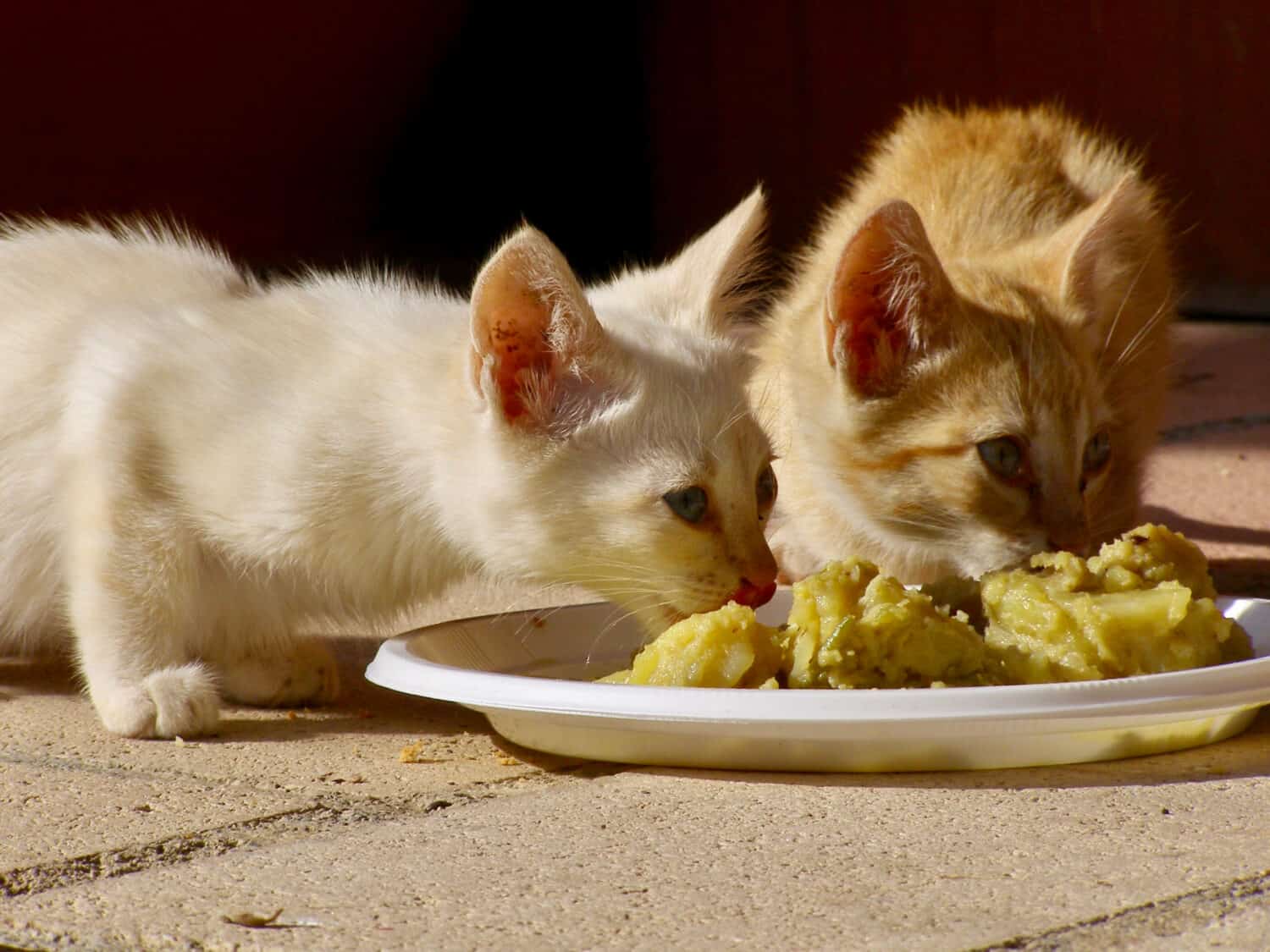Many cat owners are tempted to share their meals with their cats, but knowing which human foods are safe for them to eat is crucial. While cats have unique dietary requirements, certain human foods can be safe and even beneficial when given in moderation.
Being aware of what foods you can share with your cat not only satisfies their curiosity but also adds some variety to their diet without risking their health. In this article, we’ll explore a few safe human foods for 2cats, allowing you to enhance their meals with confidence and care.
Safe Human Foods for Cats
Here’s a selection of human foods that are safe for your cat and can provide some health benefits.
1. Cooked Chicken
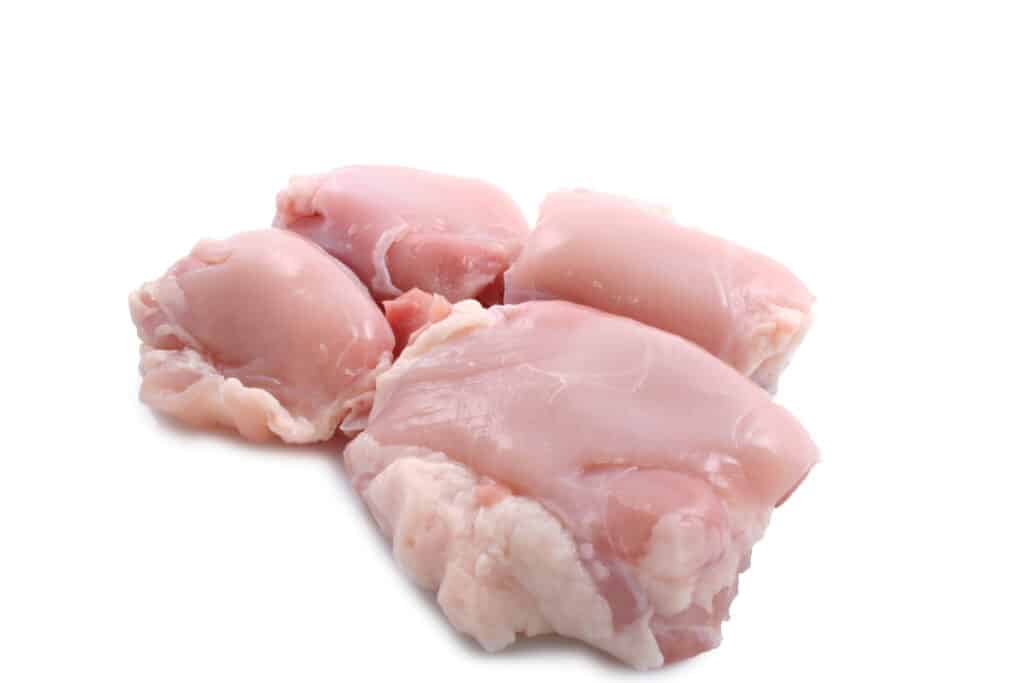
Boiled, shredded, and unseasoned chicken can be a great human food addition to your cat’s diet.
©Collinquint21/Shutterstock.com
Biologically, cats are carnivores, so they naturally love meat, and chicken often lands on their menu. It’s a fascinating fact that in the United States alone, cats consume an astonishing 3 million chickens annually. But is chicken really a good option for our feline friends?
Thankfully, chicken is an excellent protein source for cats, provided it’s prepared thoughtfully with their dietary needs in mind. Unlike some processed meats that are loaded with salt and fats, chicken is a lean protein that’s rich in essential feline nutrients.
While feeding your cat solely on chicken isn’t advisable, incorporating small portions of simply cooked chicken (boiled or baked) into their diet can be beneficial. Remember to balance it with other nutrient-rich foods to keep your cat healthy and happy!
2. Cooked Turkey
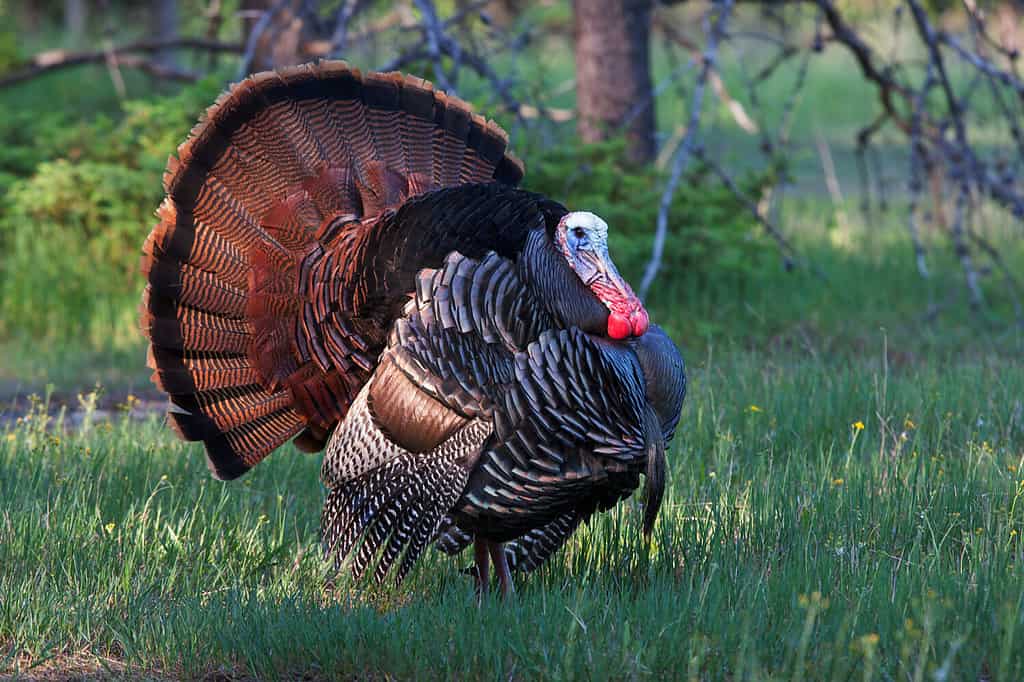
Bring your cat with you to your Thanksgiving feast because turkey meat is another human food cats can enjoy.
©Jim Cumming/Shutterstock.com
Cats can definitely enjoy a bit of turkey, and cooked turkey can be a tasty treat for them. It’s usually safe for cats in moderate amounts without overindulging them.
Be cautious not to include any regular spices and cook the meat in an extremely simple way to prevent digestive issues.
Always ensure you thoroughly read the product details and confirm that the turkey has been properly cooked before offering it to your feline companion. Pre-prepared or uncooked turkey could be harmful to your cat’s health.
Additionally, make sure there is no onion or garlic seasoning, as these spices are not good for your cat!
3. Cooked Fish
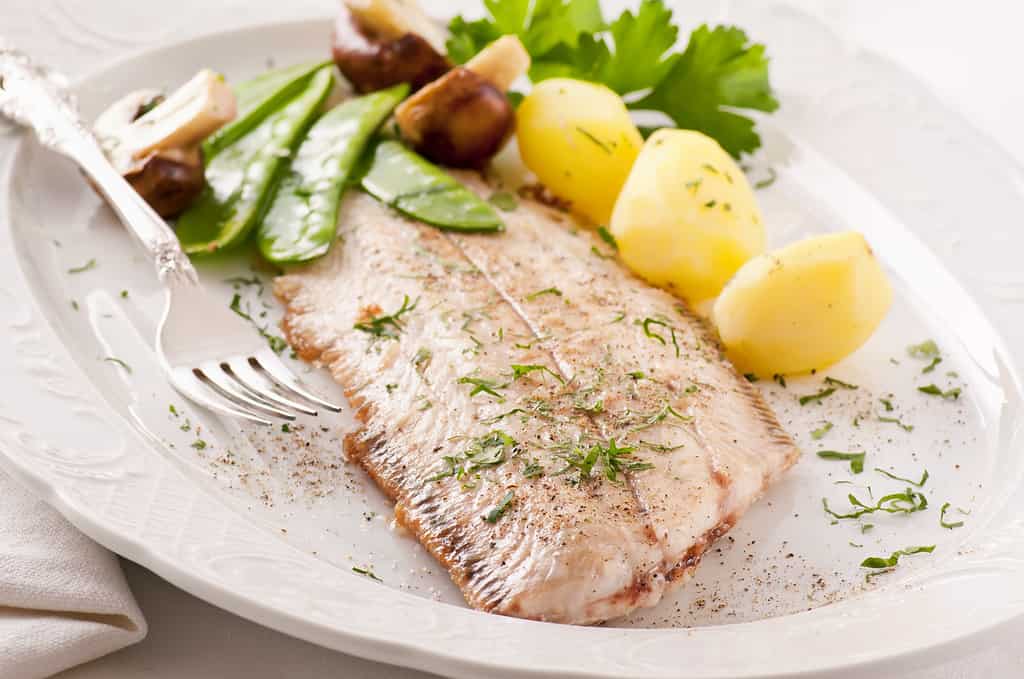
Cooked fish can be a nice treat for your cat, but it shouldn’t be a part of their regular diet.
©hlphoto/Shutterstock.com
Fish is the protein source most commonly associated with cats, but it actually isn’t the most nutritious one. Giving your cat a fish treat now and then typically won’t hurt them, but it shouldn’t be their primary food source. Although fish supplies the protein a cat needs, it lacks several essential vitamins and minerals for a balanced diet, making it something to offer only occasionally.
Giving cats raw fish is not recommended since it contains an enzyme known as thiaminase, which destroys a crucial B vitamin called thiamine. If cats lack this vitamin, they can develop severe health problems and deficiencies.
Also, don’t overlook the risk of fishbones, which can be a choking danger. Always remove bones before offering fish to your cat.
4. Beef
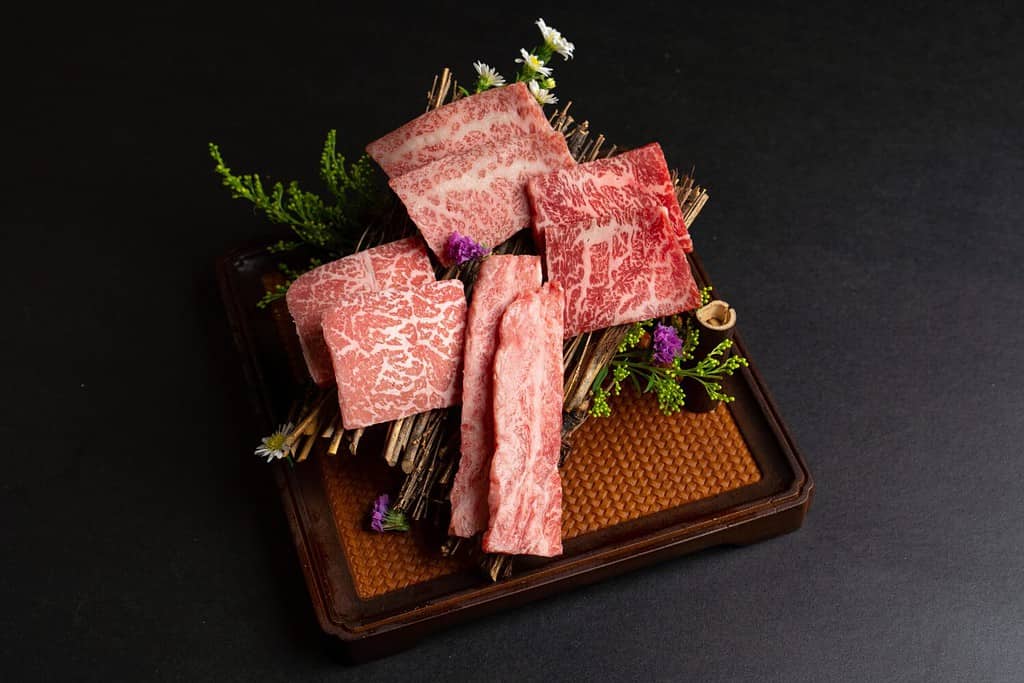
Cats can eat beef both cooked and raw.
©DannyGan/Shutterstock.com
Cats can safely consume both raw and cooked beef, but you should control their portions and exercise caution due to potential food poisoning risks associated with raw meat.
Ensure the meat you give your feline friend is fresh and free from harmful spices. Keep in mind that some cats might have food sensitivities, particularly to roast beef. To prioritize your cat’s health, consulting your vet before introducing beef into their diet is a wise decision.
If you choose to offer cooked beef, avoid any seasonings, especially those with onions and garlic, as they can be harmful to cats.
5. Cooked Lamb
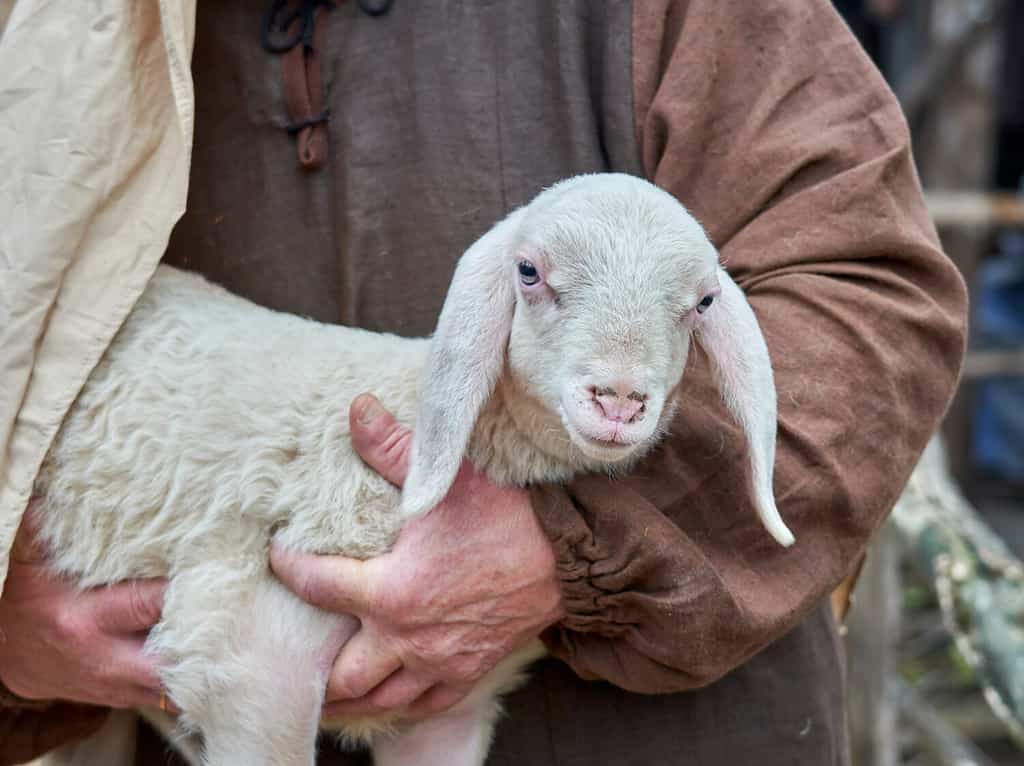
Cats should not eat lamb meat often because of its high fat content, but it can be an occasional part of their diet.
©spetenfia/Shutterstock.com
Lamb is another protein that is safe for feline consumption if introduced gradually and in small portions. However, it is important to be cautious due to its high fat and cholesterol levels. It is suitable only as a limited component of a cat’s diet.
Before feeding raw lamb to your cat, it is crucial to seek approval from your veterinarian. Uncooked meat may contain parasites or bacteria that can cause digestive issues in cats.
6. Blueberries
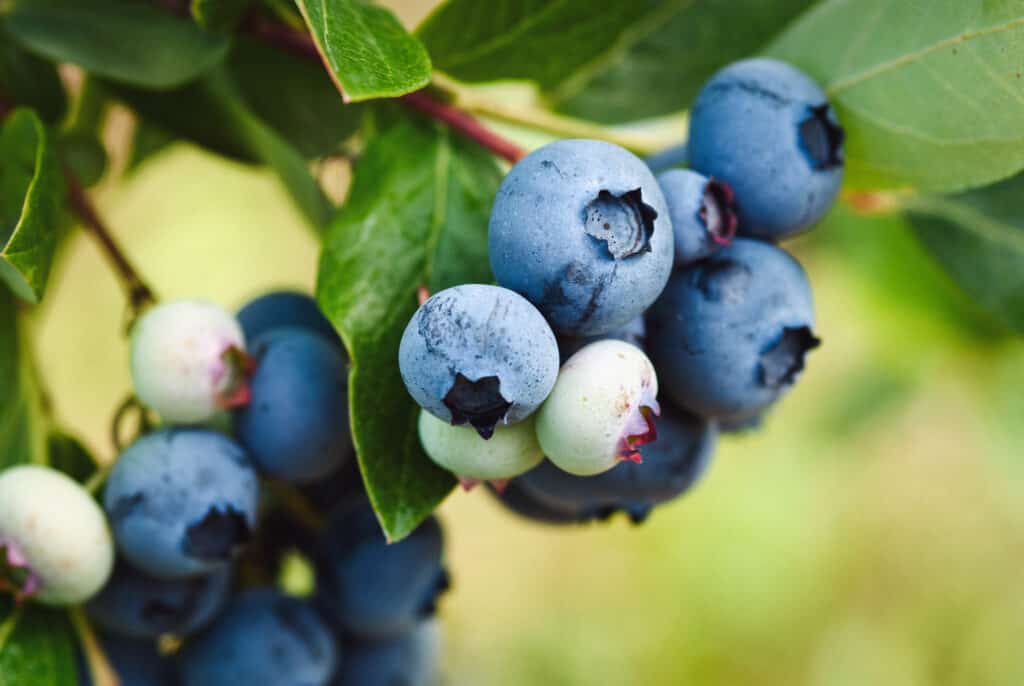
Cats can enjoy blueberries as a special human food treat!
©iStock.com/Nadya So
Although blueberries are commonly regarded as a “superfood” for humans, they may not offer the same advantages for cats. However, blueberries can still provide some dietary benefits for cats. The antioxidants present in blueberries may positively impact a cat’s health by neutralizing harmful free radicals and supporting immune and joint health.
In moderation, blueberries are safe for cats to enjoy as a treat.
7. Watermelon
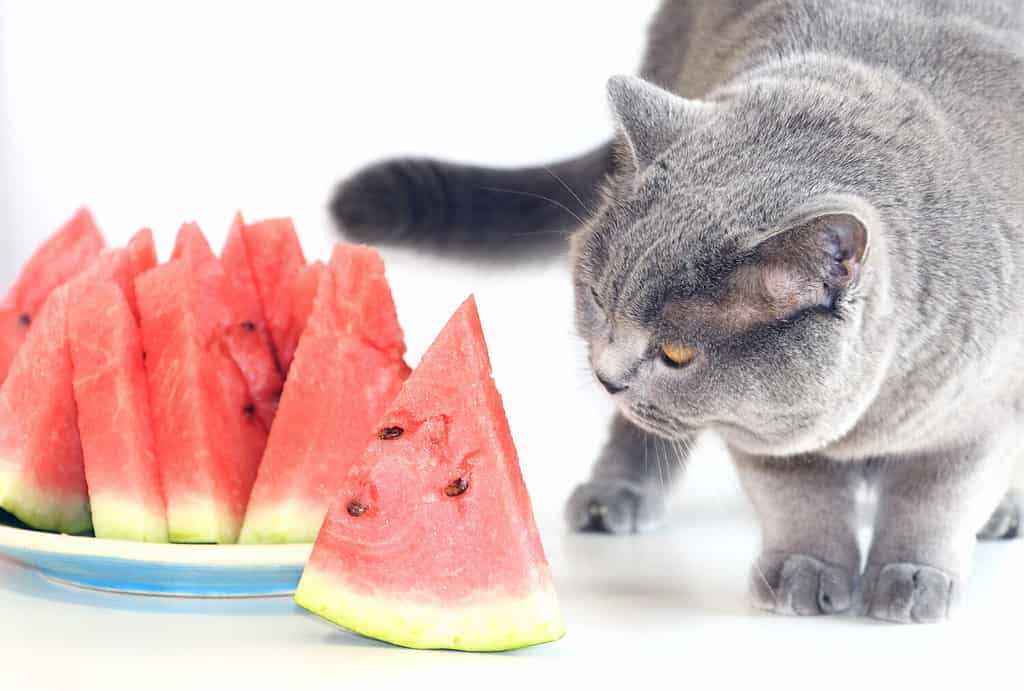
Watermelon is neither beneficial nor harmful to cats.
©Sagittarius_13/Shutterstock.com
Occasionally, cats can enjoy small portions of watermelon without any harm. However, it’s important to remember that watermelon is not a necessary part of their diet. It’s best to offer only a small bite or two as an occasional treat.
Ensure that you only serve the flesh and remove all the seeds, as they contain cyanide, which can be toxic to cats. For overweight or diabetic cats, it is advisable to avoid giving them watermelon due to its high natural sugar content.
8. Pear
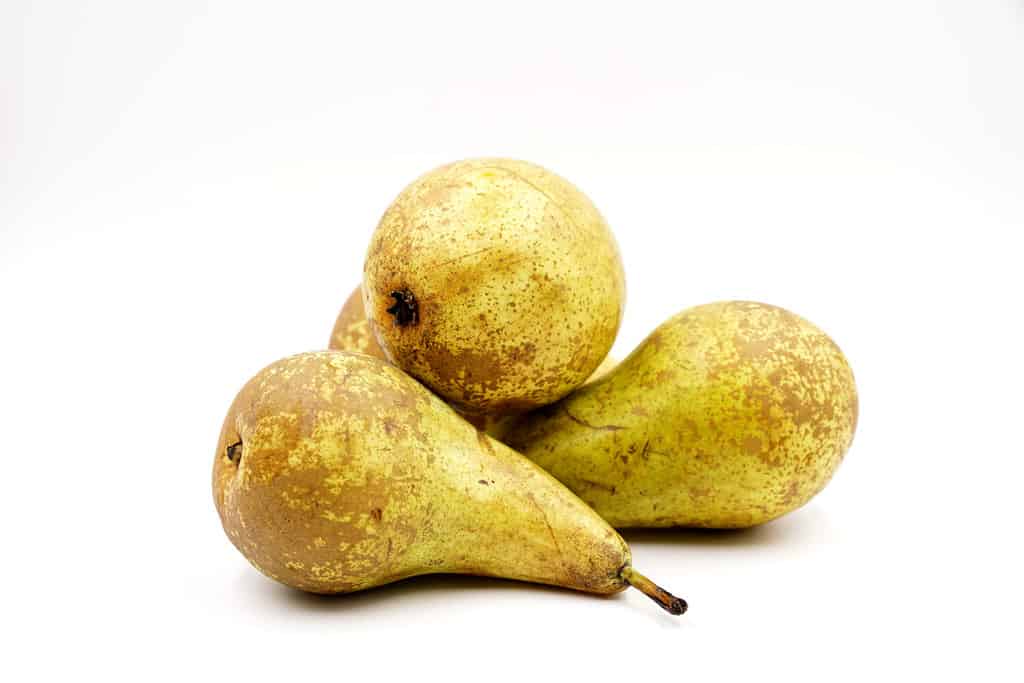
Pears can be given to felines in moderation, but watch out for the high sugar content!
©Yoyochow23/Shutterstock.com
Cats can safely enjoy the flesh of pears in moderation. However, as with many other fruits, pears should only really be an occasional special treat.
Avoid giving your cat pear seeds, as they contain cyanogenic glycosides (cyanide), which can be harmful.
Cats with strict medical diets, particularly those dealing with diabetes or weight issues, should avoid pears as a treat. The sugar content in pears can elevate blood sugar levels, making them unsuitable for these cats.
9. Strawberry
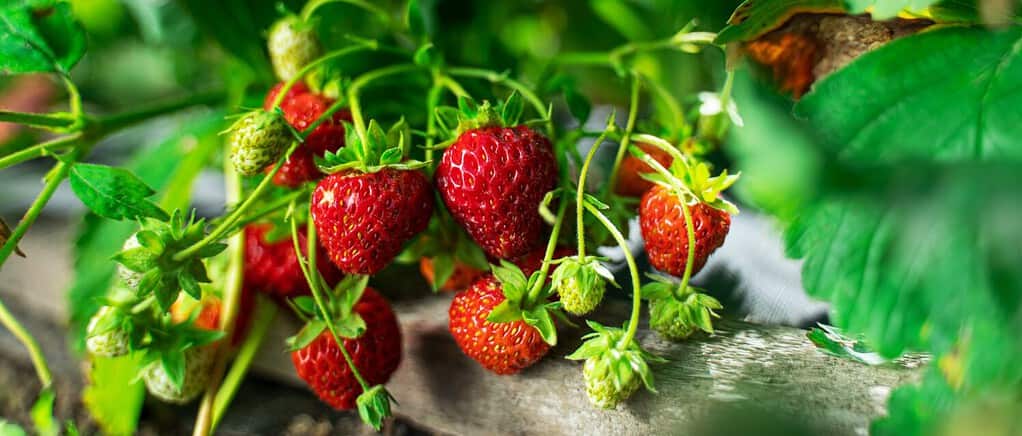
Another human food that cats can eat is strawberries.
©V_Sot_Visual_Content/Shutterstock.com
Strawberries are considered safe for cats! So if your feline friend happens to nibble on a small piece from your dish, there’s no need to worry about any adverse effects.
Before giving strawberries to your cat, make sure to remove the leaf and stem. Don’t forget to cut it into small pieces, as this fruit can pose a choking hazard if the cat tries to gobble it too quickly.
10. Cucumber
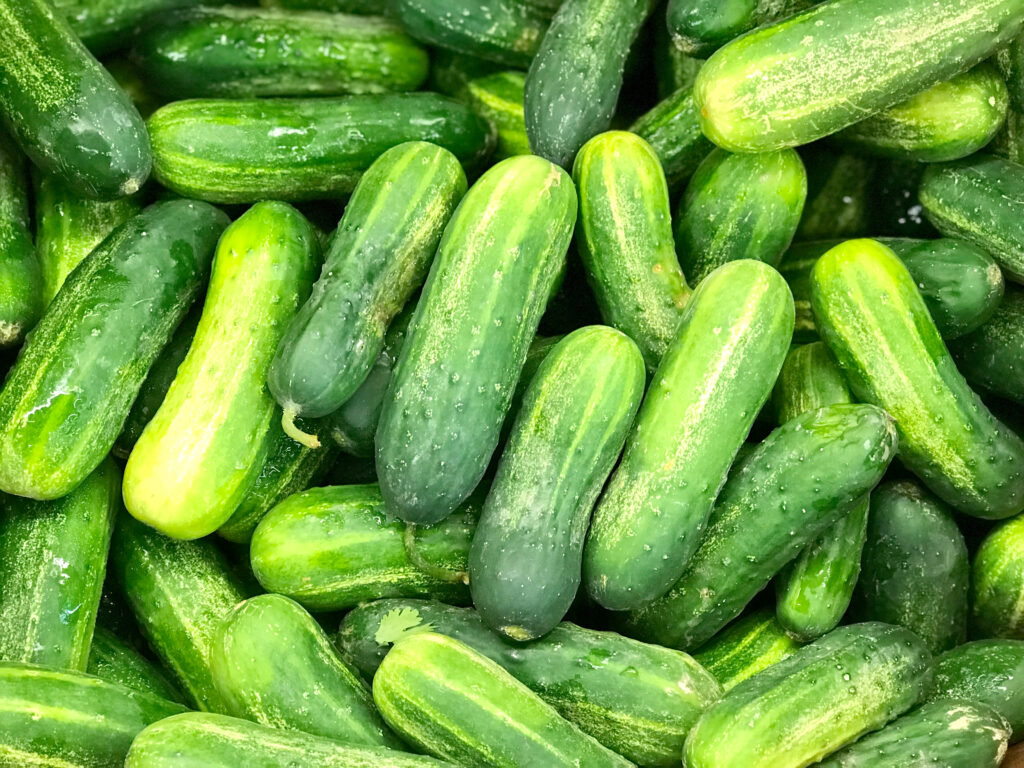
It is unlikely that your cat will enjoy cucumbers, but you can sure try to give it to them!
©Mohammad Hossen/Shutterstock.com
Cats can safely eat cucumbers, but they may not find them as appealing as their usual meat-based food. Surprisingly these veggies have health benefits for cats. They are mild in flavor and have high water content, which makes them a nice treat for cats. That said, it is doubtful that your cat will find cucumbers to be its favorite treat. Remember, felines are naturally carnivores and cucumber is essentially the opposite of meat…
It is essential to be cautious and not give too many cucumbers to your cat, as excessive consumption might cause gastrointestinal issues, such as diarrhea.
11. Carrots
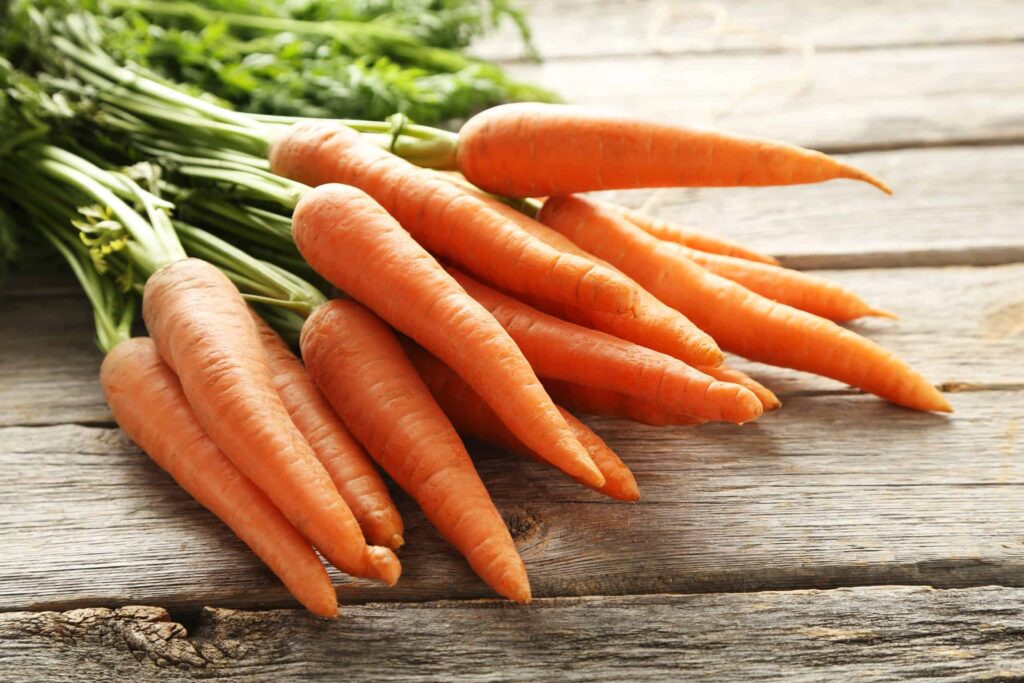
Don’t give raw carrots to your cats. But they can enjoy a small amount of cooked carrots!
©5 second Studio/Shutterstock.com
Carrots are safe vegetables for cats and can provide some nutritional benefits similar to humans. However, it’s important to avoid giving raw carrots to your cat and opt for cooked carrots instead, offered in small portions, as a treat.
While you may want to enhance the flavor of the carrots for your cat, refrain from adding any seasoning, as certain ingredients can be harmful or toxic to cats.
Keep the preparation simple and free from any harmful additives to ensure the safety and well-being of your feline friend.
12. Pumpkin
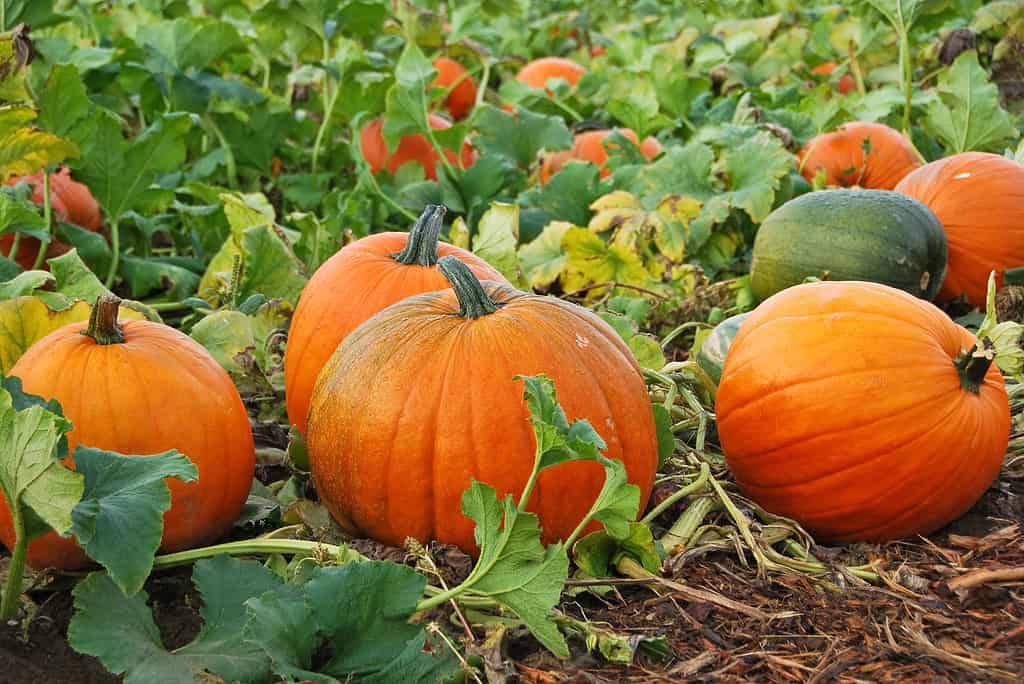
Avoid the canned variety, but fresh pumpkin can be a great seasonal human food for your cat.
©Loren L. Masseth/Shutterstock.com
Unseasoned 100% pumpkin (NOT the canned stuff used for pumpkin pie) is safe and can be beneficial for cats experiencing digestive issues. It contains vital nutrients like potassium, phosphorus, calcium, and vitamins.
Although pumpkin seeds are not toxic to cats, they can present a choking hazard, particularly if ingested quickly. Feeding too many seeds may result in intestinal blockage, so it’s advisable to refrain from giving them to your cat.
13. Green Beans
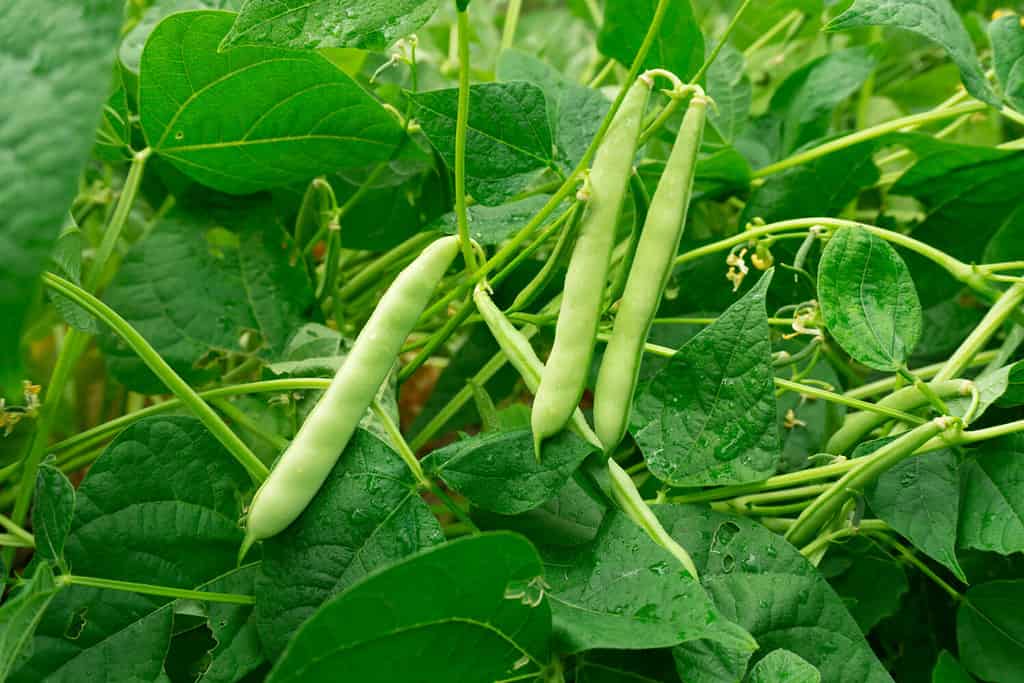
Green beans are not naturally a part of feline diets, but they can be very beneficial to your cat’s health.
©Catherine_P/Shutterstock.com
While cats mainly need meat, green beans can add fiber to their diet, which helps with digestion. Additionally, these beans contain vegetable protein, which can supplement the protein your cat gets from meat and fish.
Most cats may find green beans tasty. While some cats might like the crunch of raw beans, cooking them makes them easier to chew, especially for cats with dental issues. Cooking green beans also enhances their flavor and smell, making them more appealing, and helps in easier digestion.
14. Steamed Broccoli
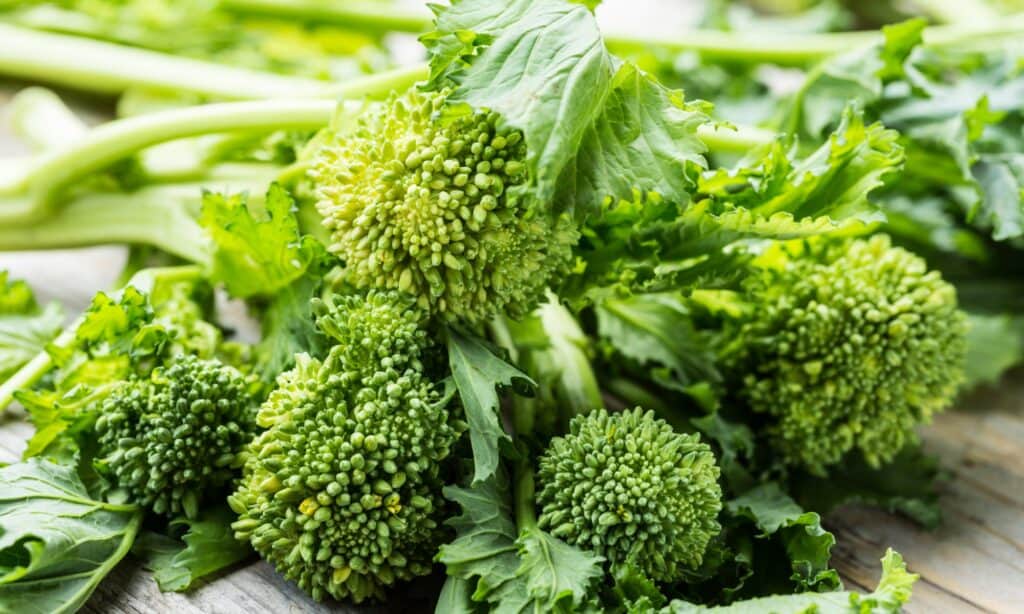
Steamed broccoli is an excellent vegetable to give your cat.
©iStock.com/Quanthem
Rich in antioxidants, broccoli can help minimize free radicals in your cat’s body. It may also aid in regular bowel functions and soothe upset stomachs. Moreover, the bright green texture of the florets could divert your cat’s attention from chewing on houseplants.
When offering broccoli to your cat, ensure it’s plain and without seasoning. It’s advisable to steam the broccoli to soften it for easier chewing.
15. Wheat
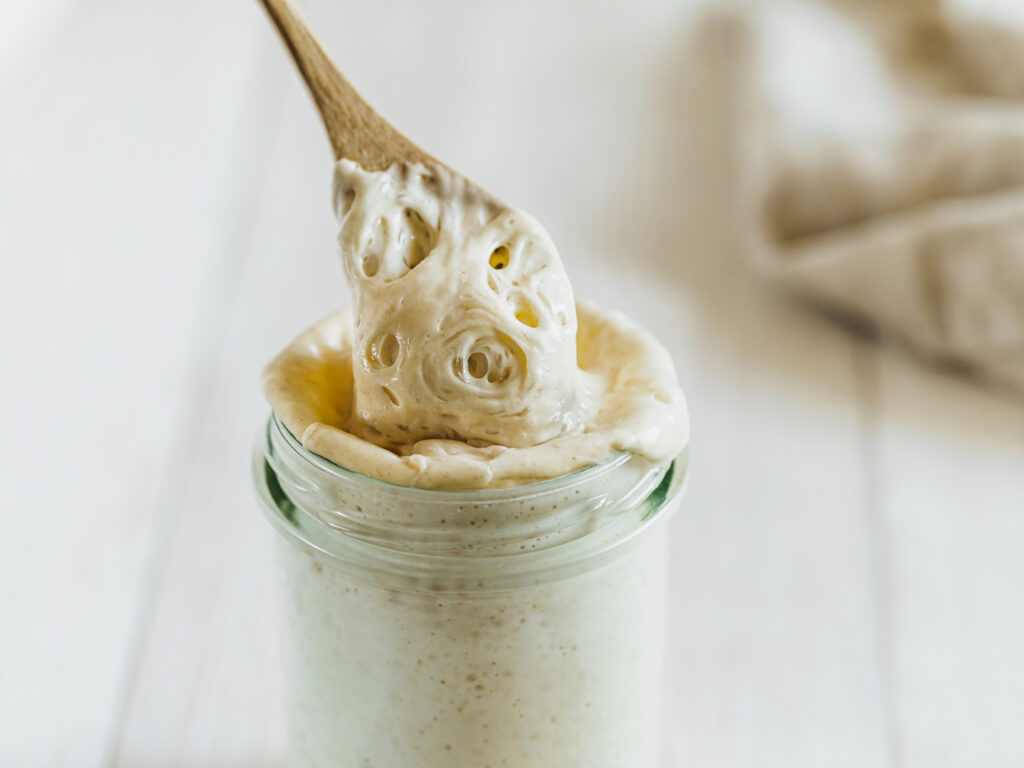
Human food made from wheat is another thing your cat can eat with you.
©Fascinadora/Shutterstock.com
Wheat isn’t harmful to cats and can even contribute some vitamins and minerals to their diet. Though it’s not essential for their well-being, the fiber in wheat might aid in maintaining regular digestion. Yet, an excessive amount of wheat may lead to issues like an upset stomach.
A few cats might react allergically to gluten, a common substance in wheat products.
It’s crucial to emphasize that if your cat has specific health conditions or is on medication, consulting with a veterinarian before introducing any wheat-based items to their diet is always the best course of action.
Foods to Avoid
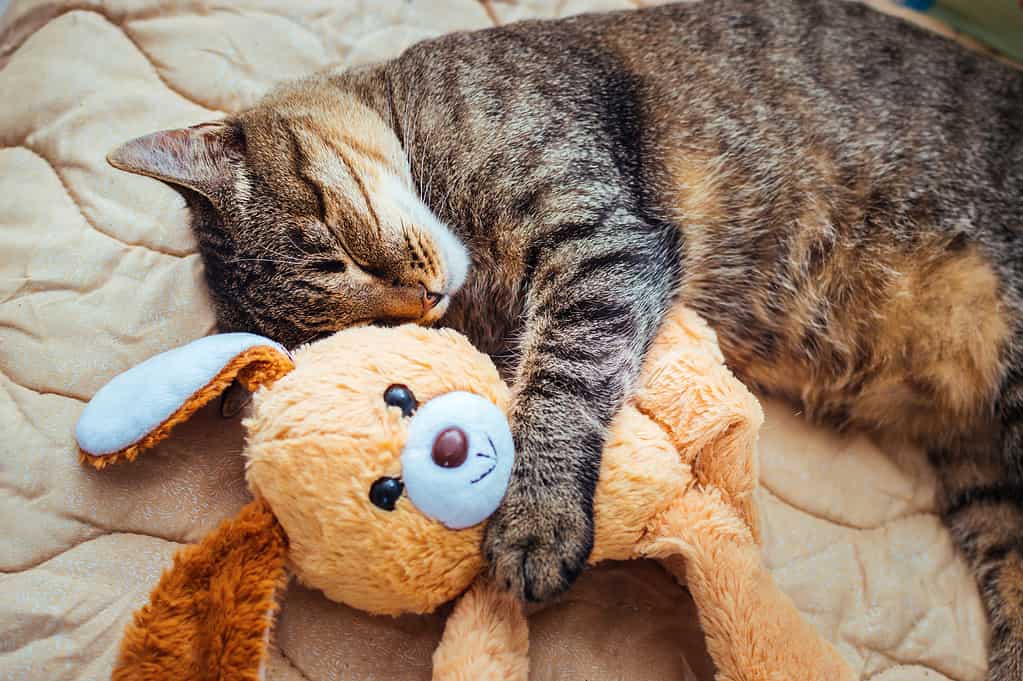
There are plenty of foods you should avoid feeding your cat.
©anastas_/1391797125 via Getty Images
As you can see, there are a TON of human foods that your cat can eat with you. But, next, let’s take a closer look at the foods you should never include in your cat’s diet.
Chocolates
Chocolate is extremely toxic to cats due to its content of both caffeine and theobromine. These substances function as stimulants and can be fatal even in small quantities when ingested by a cat.
Dairy
While popular culture may make you think that it is perfectly fine to give your cat a bowl of cow’s milk, you should NEVER do this. Dairy products such as milk, cheese, or cream can be harmful to cats, contrary to popular belief. Most cats have lactose intolerance, which can lead to stomach upsets, vomiting, and diarrhea if they consume dairy.
Onion
Onions contain compounds that can cause various types of red blood cell damage when ingested by cats. Keep onions away from cats at all costs, as they can be harmful to your pet.
Nuts
Feeding cats nuts can pose multiple risks, including choking and intestinal obstruction. Also, their high fat content and calorie density make them unsuitable for feline consumption.
Garlic
Garlic, whether fresh, cooked, or in powdered form, contains n-propyl disulfide, a substance toxic to cats. It’s part of the Allium spp vegetable family, and it’s essential to avoid feeding it to your cat.
Raisins & Grapes
The reason is unknown, but even small amounts of grapes and raisins can lead to kidney failure in cats, resulting in illness. Early symptoms may include vomiting and hyperactivity.
Caffeine
Cats have a heightened sensitivity to caffeine, which can result in hazardous elevations in blood pressure and cardiac arrhythmias. Even a small amount of exposure can lead to adverse effects such as vomiting, diarrhea, tremors, or seizures.
Alcohol/Foods Containing Alcohol
Even in small quantities, ethanol a chemical found in alcohol (beer, wine, and liquor), can be dangerous to cats. Their small size makes them more susceptible to its effects, leading to severe intoxication.
Raw Meats
Avoid feeding raw meats to cats, as they often contain harmful bacteria and parasites. These pathogens can lead to sickness, making raw meats an unsafe choice for a cat’s diet.
Seeds
Though not highly toxic, the fat content in seeds can disturb a cat’s stomach, causing vomiting or diarrhea. Choking hazards also exist, so it’s best to avoid sharing seeds with your cat.
Feeding Guidelines and Considerations
Feeding human food to your cat can be an occasional treat, but there are several guidelines and considerations to remember:
Moderation and Balance:
- Human food should be given sparingly and never as a substitute for a complete and balanced cat diet. Cats require specialized nutrients found in cat food. For information on specialized cat food, see the best cat foods.
- Limit treats and human food to 10% of a cat’s daily caloric intake to maintain nutritional balance.
Portion Control:
- Serve small portions tailored to your cat’s size and energy needs.
- Too much human food can cause weight gain and other health issues.
Allergies or Sensitivities:
- Be mindful of allergies or food sensitivities, watching for symptoms like itching or digestive problems.
- Introduce one new food at a time to easily pinpoint any adverse reactions.
Potential Hazards:
- Avoid foods known to be harmful to cats, such as chocolate, garlic, and onions.
- Ensure human food is plain and unseasoned, without any added salt, sugar, or spices.
Consulting with a Veterinarian:
- Speak with a veterinarian for personalized advice, especially if your cat has specific health needs or dietary restrictions.
Cooking and Preparation:
- Cook human food properly, avoiding raw meats which may contain harmful pathogens.
- Remove any choking hazards like bones or seeds.
Summary of Safe Human Foods For Your Cat
| Safe Human Food for Cats | Precautions |
|---|---|
| Cooked Chicken | Without seasoning, spices, skin, and bones. Cooked thoroughly |
| Cooked Turkey | Without skin, seasoning, and bones. Feed small portions only. |
| Cooked Fish | Thoroughly cooked. Without seasoning, skin, and bones. |
| Beef | Without seasoning, bones, and fat. |
| Cooked Lamb | Small portions only. Thoroughly cooked without any seasoning. |
| Blueberries | Wash them properly. Feed only in small portions. |
| Watermelon | Wash it properly. Chop it into bite-size pieces. Remove seeds |
| Pear | Wash it properly. Remove seeds before feeding. |
| Strawberry | Clean them thoroughly. Cut in small pieces and feed in moderation. |
| Cucumber | Peel and wash it before feeding. Cut in small pieces. |
| Carrots | Wash and cook them thoroughly. |
| Pumpkin | Without seeds. Best to feed cooked pumpkin without seasoning. |
| Green Beans | Wash thoroughly and feed in small portions. |
| Steamed Broccoli | Cooked without seasoning. Small portions only. |
| Wheat | Before feeding, consult with the vet if your cat has health issues. |
Thank you for reading! Have some feedback for us? Contact the AZ Animals editorial team.

